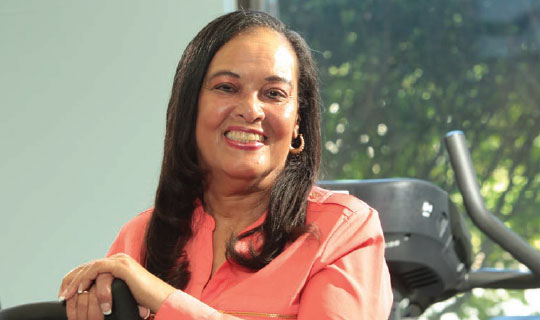“I’m at a loss for words to explain what it feels like to have this second chance at life.”

Top talent and technology allowed a woman to survive until a lung donation was available.
“I learned in 2016 that I would eventually need a lung transplant,” says Dawn Burke, 60, of Keyport. She had idiopathic pulmonary fibrosis (IPF) a disease that scars the lungs. ("Idiopathic” means the reason is unclear. Dawn had never smoked or, to her knowledge, been exposed to anything to cause the condition).
Her earliest treatments involved regular monitoring by transplant physicians at Newark Beth Israel Medical Center (NBI) and portable oxygen tanks at home. But by 2019, that was no longer enough. “In May, I went into the hospital knowing my condition was very advanced,” she says. With IPF, scarring of the lungs cannot be stopped. Further, whether or when a lung could be available for transplant could not be predicted. Both she and her lung transplant team at NBI were up for the challenges ahead.
“Last year, physicians from some of the country’s top lung transplant programs joined the experienced team already in place here.” says Thomas Kaleekal, MD specialist in pulmonary critical care and Medical Director of NBI’s Advanced Lung Diseases and Transplant Program. We’re part of a group of more than a hundred professionals working to make each transplant possible.”
Support While Waiting
Dawn’s team at NBI needed to give her increasing amounts of oxygen in the following weeks. They also worked to help her to remain physically active, so she could be as strong as possible when a donor lung was available. "Our patients are often in a battle against time, so we’ve put steps in place to make sure they have as much time as possible to wait for a transplant,” says Harpreet Grewal, MD, a pulmonary-critical care specialist and part of the lung transplant team at NBI.
“My doctor asked every day how many laps I made around the nursing floor," Dawn says with a laugh. But her condition worsened, and walking became too difficult. A month into her hospital stay and despite everyone’s efforts, respiratory failure was imminent. In many other hospitals, patients at this stage would need advanced equipment that requires them to be sedated and in intensive care. But at NBI, the entire transplant team has the skills and training to use the same equipment and still allow a patient to remain mobile.
At day 36 of her stay, Dawn was able to walk down the hall with this advanced equipment known as "awake ECMO” (extracorporeal membrane oxygenation) in tow. Literally by her side, helping her with this exercise were Advanced Mobilization Team (AMT) members. The effort by her AMT helped her to maintain her strength while waiting for her organ.
Four days later, all rejoiced to learn that a suitable organ had become available for Dawn. The transplant was a success. She was home two weeks later, no more oxygen tanks needed.
"I’m at a loss for words to explain what it feels like to have this second chance at life,” she says. At one point Dawn couldn't walk five feet. Today, she’s training to walk a 5K to support transplant programs. Says Dr. Grewal. People like Dawn are the reason we do what we do.”
Learn more about the Advanced Lung Diseases and Transplant Program at Newark Beth Israel Medical Center, call 1-888-NJLUNG1.